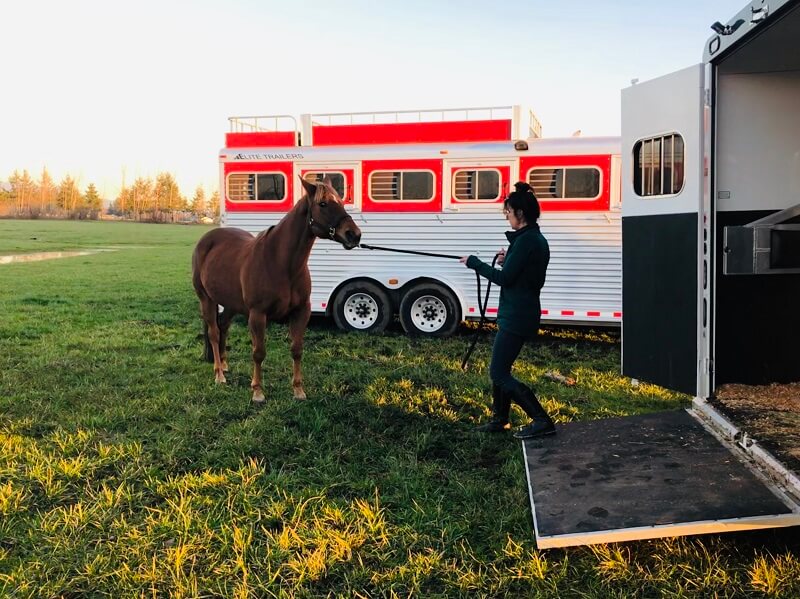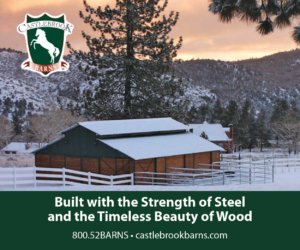Disaster Preparedness on the Farm
By Theresa Rice

Whether you keep your horses on your own property or board them, disaster preparedness is something you need to consider. I know it’s not a fun topic to think about, but recent events have highlighted how important it is to have a plan—even if it seems disaster will never visit your little slice of heaven.
In November 2018, the Camp Fire near Paradise, California was the United States’ deadliest fire since the Cloquet fire of 1918. The Camp Fire burned almost 240 square miles and claimed the lives of 86 citizens and countless animals.
In the Northwest, fires are a very real threat—but they aren’t the only one. Flooding and severe weather also cause problems for our communities. County governments conduct routine risk assessments and tell you what the biggest risk for your area is. This gives you a better idea of how best to prepare.
The start of any good disaster response is to have a plan in place long before the threat of disaster looms. The emotional connection we have with our animals makes the need for a plan even more important. That bond can cloud our judgment during times of crisis, resulting in decisions that may jeopardize our own safety.
There are several free educational resources you can take advantage of to help you prepare for the worst. Here are three from FEMA:
- Livestock in Disasters training.fema.gov/EMIWeb/IS/is111a.asp
- Animals in Disaster – Module A, Awareness and Preparedness training.fema.gov/EMIWeb/IS/is10a.asp
- Animals in Disaster – Module B, Community Planning training.fema.gov/EMIWeb/IS/IS11a.asp
Contained within the training modules are subjects related to mitigating risk around your property. Risk mitigation might include building levees around ponds and drainage ditches, securing buildings so that items don’t become projectiles in high winds, or steps to reduce the fire danger on your property.
You’ll also want to consider needed steps in the event of an evacuation. Horses should be trained and comfortable loading onto a trailer quickly. Twenty minutes to coax Suzie the stubborn donkey might not seem like a big deal normally, but in an emergency, evacuation time is precious and can’t be wasted. Keeping your trailer in good working order will also help you avoid further delays.
If you don’t own a trailer, you’ll need to make arrangements with someone who does. You should have a few contingency plans in case your rescue trailer is held up or used to evacuate other animals.
Make plans with friends or family for a place to keep your animals, large and small, during the evacuation order. Ideally, the location should be some distance away from your own property so you’re out of the immediate threat.
When evacuating you should also plan to pack plenty of hay and grain and have access to drinkable water. The Humane Society has an excellent article on disaster planning with horses in mind that can be found at www.humanesociety.org/resources/disaster-preparedness-horses
Depending on the most likely type of threat to your area, you should also prepare for dealing with the aftermath. In cases of drought or severe winter weather, starvation and dehydration will be top priorities for continued animal care. After a fire you may be dealing with complications from smoke inhalation and burns, which will require veterinary advice and care. In the event of a flood, you might be working to get stranded animals to higher ground and access to clean water and feed. Animals that have spent several days in flooded areas can also have serious skin wounds and secondary infections, which will require veterinary advice and intervention.
Although we hope that our farms and ranches are always prosperous and our animals healthy, we do need to spend time considering the unthinkable. In addition to taking the FEMA courses, you can learn more at the Large Animal Technical Rescue Facebook page (www.facebook.com/groups/tlaer). The page administrators are veterinarians and disaster responders who examine real-life scenarios and give ideas on best practices, mitigation and avoidance.
Don’t let the first time you think about disaster be when it’s an emergency announcement on your local news.

Theresa grew up riding horses off and on throughout her life, finally fulfilling her dream of horse ownership in 2012. She is currently working on her first novel, inspired by her time spent working on a guest ranch in Arizona where she met her husband. They married in 2012. When not writing, you can find her riding her half-Arabian gelding, Gangster, or chasing after her two German Shepherds. website: www.sassinboots.com




